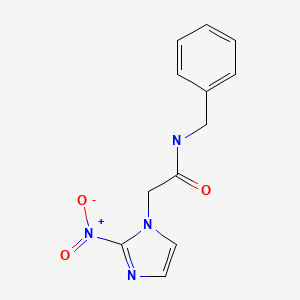CASRN: 22994-85-0

Drug Levels and Effects
Summary of Use during Lactation
Benznidazole is excreted into milk in dosages much lower than the treatment dosage for infants. Because of the low levels of benznidazole in breastmilk and safety when given directly to infants, its use is acceptable in nursing mothers.
Drug Levels
Maternal Levels. Seventeen breastmilk samples were obtained at unspecified times from 10 women being treated for Chagas disease with benznidazole 5 to 10 mg/kg daily. Breastmilk concentration varied between undetectable (<0.3 mg/L) and 9.8 mg/L, with a mean of 4.1 mg/L.[1] A fully breastfed infant would receive a daily dosage of 0.6 mg/kg daily using the mean breastmilk level and 1.5 mg/kg daily using the maximum value. These values are much less than the therapeutic dosage of 5 mg/kg daily that has been used safely in newborn infants with congenital Chagas disease.[2,3]
Ten women with chronic Chagas disease received benznidazole in an oral dose of 300 or 400 mg (median 5.65 mg/kg) twice daily for 30 days. Sixteen breastmilk samples were obtained at a median of 9 days (range 6 to 34 days) of therapy. The median breastmilk benznidazole level was 3.8 mg/L (range 0.3 to 5.9 mg/L). The median calculated infant dosage was 0.65 mg/kg daily, which is about 10% of the dose used to treat infants for Chagas disease. This dosage translated to 12.3% (range 1.3 to 17.0%) of the maternal weight-adjusted daily dosage.[4]
Four women with Chagas disease were treated with benznidazole 5 to 10 mg/kg daily in 2 divided doses provided breastmilk samples for analysis after 4 to 10 days of therapy. The timing of the sample with respect to doses was not reported. Breastmilk concentrations of benznidazole ranged from nonquantifiable (<0.88 mg/L) to 7.1 mg/L.[5]
Infant Levels. Relevant published information was not found as of the revision date.
Effects in Breastfed Infants
Ten women with chronic Chagas disease received benznidazole in a median oral dose of 5.65 mg/kg twice daily for 30 days. Median infant age Ten women with chronic Chagas disease received benznidazole in a median oral dose of 5.65 mg/kg twice daily for 30 days. Median infant age was 5.2 months (range 20 days-13 months). Five children were exclusively breastfed and the others partially breastfed. None of the infants had any adverse reactions attributable to benznidazole.[4]
A postpartum woman diagnosed with Chagas disease was treated with benznidazole 5 mg/kg daily beginning one month postpartum and continuing for 30 days. She continued to breastfeed (extent not stated) her infant. The authors reported that no adverse effects were seen in the infant.[6]
Effects on Lactation and Breastmilk
Relevant published information was not found as of the revision date.
References
- 1.
- Marson M, Padro J, Reta M, et al. A simple and efficient HPLC method for benznidazole dosage in human breast milk. Ther Drug Monit 2013;35:522-6. [PubMed: 23851912]
- 2.
- Drago B, Kimura D, Rovnaghi C, et al. Double-blind, placebo-controlled pilot randomized trial of methylprednisolone infusion in pediatric acute respiratory distress syndrome. Pediatr Crit Care Med 2015;16:e74-81. [PubMed: 25634565]
- 3.
- Chippaux J, Salas-Clavijo A, Postigo J, et al. Evaluation of compliance to congenital Chagas disease treatment: Results of a randomised trial in Bolivia. Trans R Soc Trop Med Hyg 2013;107:1-7. [PubMed: 23296694]
- 4.
- García-Bournissen F, Moroni S, Marson M, et al. Limited infant exposure to benznidazole through breast milk during maternal treatment for Chagas disease. Arch Dis Child 2015;100:90-4. [PubMed: 25210104]
- 5.
- Padró J, Pellegrino V, RB, Echevarria R, et al. Development of an ionic-liquid-based dispersive liquid-liquid microextraction method for the determination of antichagasic drugs in human breast milk: Optimization by central composite design. J Sep Sci 2015;38:1591-600. [PubMed: 25711461]
- 6.
- Vela-Bahena L, Vergara R, Vite L, et al. Postpartum treatment without interrupting breastfeeding in a patient with Chagas disease. Ginecol Obstet Mex 2015;83:487-93. [PubMed: 26591033]
Substance Identification
Substance Name
Benznidazole
CAS Registry Number
22994-85-0
Drug Class
Breast Feeding
Lactation
Milk, Human
Antiparasitic Agents
Antiprotozoal Agents
Nitroimidazoles
Trypanocidal Agents
Disclaimer: Information presented in this database is not meant as a substitute for professional judgment. You should consult your healthcare provider for breastfeeding advice related to your particular situation. The U.S. government does not warrant or assume any liability or responsibility for the accuracy or completeness of the information on this Site.
Publication Details
Publication History
Last Revision: December 15, 2024.
Copyright
Attribution Statement: LactMed is a registered trademark of the U.S. Department of Health and Human Services.
Publisher
National Institute of Child Health and Human Development, Bethesda (MD)
NLM Citation
Drugs and Lactation Database (LactMed®) [Internet]. Bethesda (MD): National Institute of Child Health and Human Development; 2006-. Benznidazole. [Updated 2024 Dec 15].